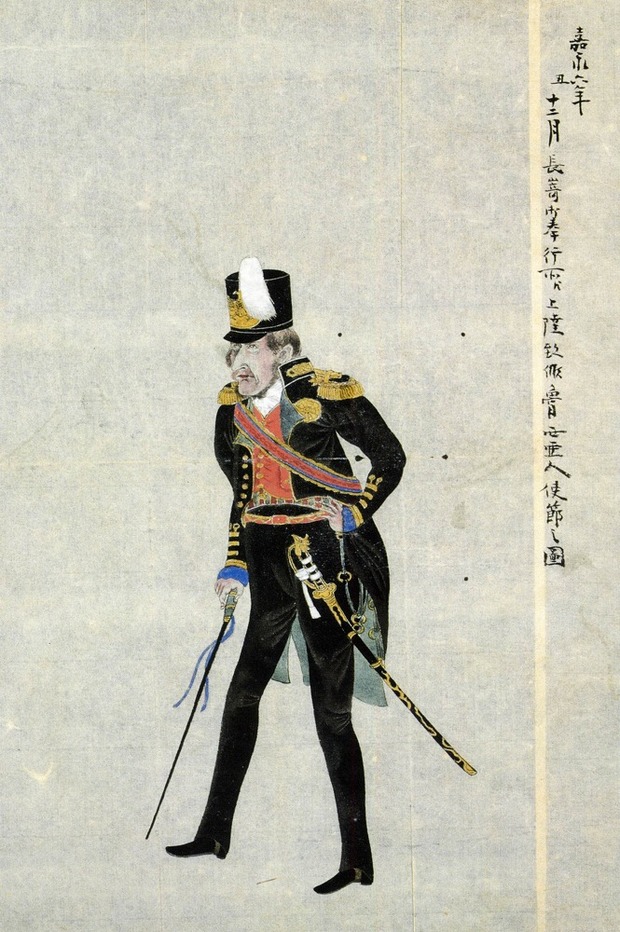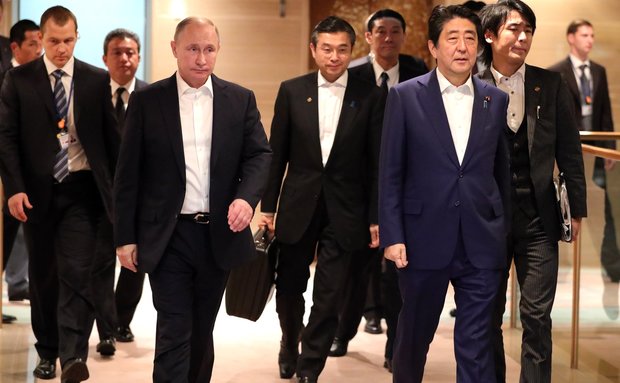''What Putin hinted at when presenting a samovar of the 19th century to Japanese Prime Minister is anybody's guess''
But why the head of Land of the Rising Sun presented Vladimir Putin a painting with Admiral Putyatin is clearly seen
Russian President Vladimir Putin visited Japan last week. A columnist of Realnoe Vremya, Orientalist Larisa Usmanova in her column explained why this visit can be considered an important historical event, what hidden meaning the painting presented to Putin by Prime Minister of Japan Shinzō Abe has, and why it's time to stop thinking by patterns of the Cold War.
''Vladimir Putin has never visited Japan for no reason''
The fact that last time the president of Russia visited Japan more than 10 years ago, in November 2005, indicates that the current visit of Vladimir Putin to the country is very important for Russia. And significant from the point of view of the determination of both sides to solve the most important and long-standing problems in the relationship — the issue of signing a peace treaty, about which both parties openly confirmed in interviews and speeches. Vladimir Putin has never visited Japan for no reason, and all their visits were always carefully prepared by both sides. Prime Minister Abe has been seeking for it for several years. He is very determined to succeed, about which we talked about earlier in the comments.
The world since the end of the Second World War and even since the collapse of the Soviet Union has changed beyond recognition. The world order has changed, as well as the balance of powers. Both Russian and Japanese parties understand that the time to solve the most important problems in the relationship has finally come. The good news is that the first and decisive step was made by the Japanese side, which gently (after all, public opinion in the country not so clearly supports the policy of the current Prime Minister) rejects the policy of demanding of the four islands and start to speak more about the first post-war version, enshrined in the Soviet-Japanese Joint Declaration of 1956 ratified by the Soviet Supreme Council of the USSR: two islands at once, the signing of a peace treaty and a discussion of a possible transfer of another two islands.

Assuming the Declaration as a core document, Abe still hinted by presenting to Putin the painting that he hopes for the return of all four islands. The painting, a high-tech print of the original Japanese painting, imprints Admiral of the Russian Imperial Navy Putyatin during his visit to Japan and the signing of the first in the history of the two countries inter-state Treaty of Shimoda in February 1855. This first treaty between the two countries confirmed Japanese sovereignty over disputed the Kuril Islands, which were ceded to the Soviet Union in 1945 after the Second World War.
The circumstances of the signing of the Shimoda Treaty were quite peaceful and they laid friendly relations between the two countries. Putyatin arrived in Japan in 1853 for the forced opening of the country for trade with the Russian Empire. Unfortunately, the Diana ship, on which the Russian Embassy arrived, drowned during a tsunami caused by an earthquake in 1854. The crew of the Russian ship and the Russian mission were transferred to the Kheda ship provided by Japan.
What Putin hinted at by presenting a samovar of the 19th century to Japanese Prime Minister is anyone's guess. Probably, at having a cup of tea together.
''The leaders understand that there is a historic opportunity to improve relationship and they don't want to miss it''
Asahi Japanese newspaper reported that the Japanese government admits the possibility of placing of the US military bases on two islands of the South Kuril Islands in the case of their transfer to the jurisdiction of Japan. It is natural, as this area automatically falls within the scope of the Treaty between the United States and Japan. Of course, our ''patriots'' are worried. Indeed, in the minds of many supposedly patriotic citizens, the USA is still the main strategic enemy of Russia. But, at the same time, the deputies of the State Duma are drinking champagne in honour of Trump as the new president of the United States, and the president of Russia first among the world leaders congratulated him on his election victory. We have changed our foreign policy priorities. Is it really important for us that there is an American base on the Kuril Islands if Russia has a non-aggression pact with Japan, and the Russian-American relations will reach the level of cooperation, not confrontation? It is important only for those who think in patterns of the Cold War.

''We are witnessing a historic event, when the leaders understand that there is a historical chance to improve relations, and they don't want to miss it. It tells of the political acumen and sense of historical responsibility of the two leaders.'' Photo: kremlin.ru
One might think that the Japanese, having sensitively reacted to the changes, want to keep up with its strategic partner who is declaring the improvement of relations with Russia, and therefore they are changing the stiffness of their position on the issue of signing the peace treaty. We are witnessing a historic event when the leaders understand that there is a historical chance to improve relations, and they don't want to miss it. It tells of the political acumen and sense of historical responsibility of the two leaders.
Of course, public opinion of both countries is not as responsive to changes in the foreign policy, and this should be taken into account. That is why the assessments of the experts are cautious. But the leaders are telling about the first step toward signing the peace treaty and economic cooperation programme. During the visit, they signed about 80 various, mainly economic, agreements. First, for the first time the leaders of the countries have agreed on joint economic activities on southern Kuriles. Second, the softening of the visa regime. 2018 has been declared as the cross-culture year in both countries. Perhaps, it is planned to sign the peace treaty this year.
For Russia, it is the year of the presidential election, so that the current Putin's visit to Japan can be considered as a step in preparation for the elections. Sure, it will bring additional voices of support necessary for Vladimir Putin in the conditions of a deteriorating economic situation and social tensions in the country. Besides, against the background of recent failures in foreign policy (joining of Crimea and the operation in Syria), the signing of the peace treaty with Japan and the economic development of the Far East by Japanese business will certainly be a significant foreign policy success of Russia.